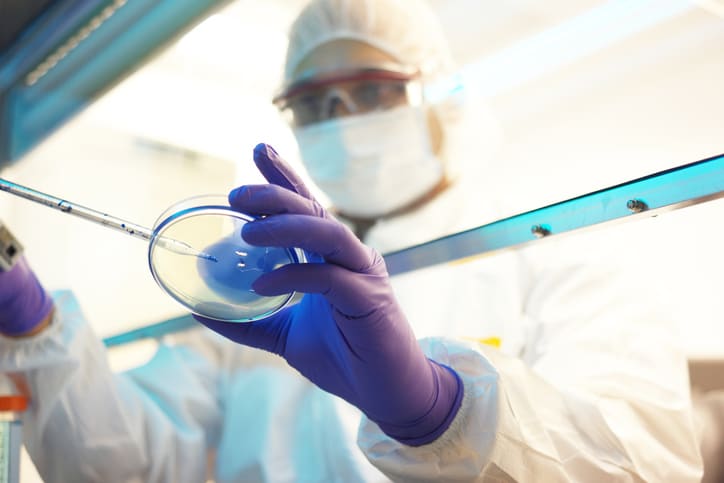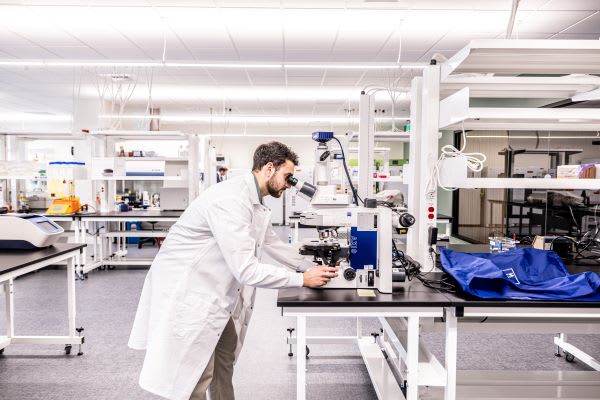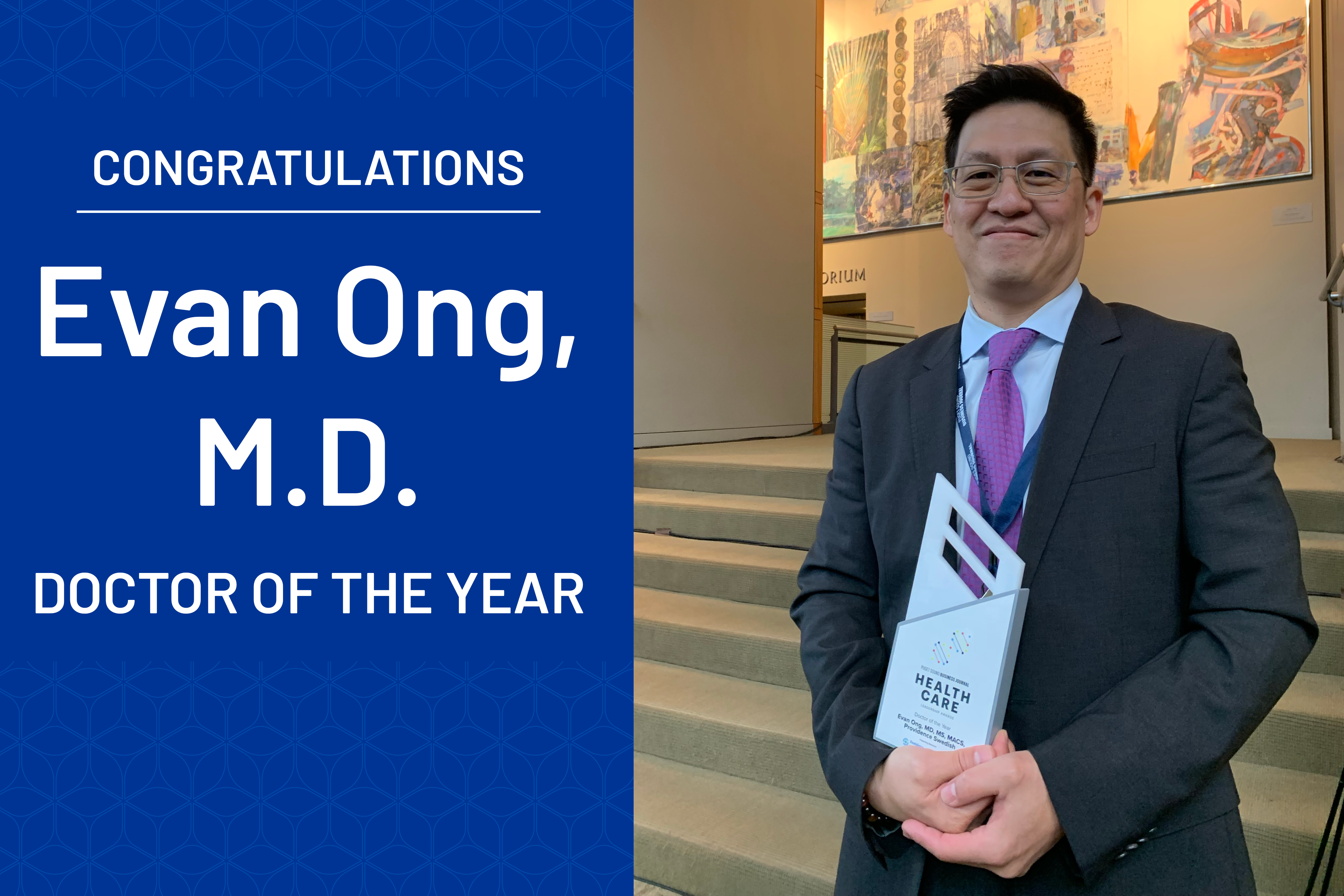Research at Swedish is saving lives. Your support will help it continue.

[6 min read]
In this article:
- At any given time researchers at Providence Swedish are involved in more than 600 clinical trials in 30 areas of study.
- Reseach at Swedish has revolutionized treatments for pain, ovarian cancer, lupus and MS.
- Philanthropy fuels the research we do by providing equipment, staff, programmatic support and a safety net to pursue lifesaving research.
- Learn more about the incredible research at Swedish and how you can support it.
There’s the young mother with melanoma, whose life was saved by experimental therapeutics. The hundreds of patients with ovarian cancer who were able to access a lifesaving trial medication years before it received federal approval. The databases and biobanks that store biological samples and genetic data to help researchers advance new treatments, potential cures, and a better understanding of debilitating health conditions.
Swedish leads the way in clinical research across the Puget Sound region. At any given time, we’re involved in more than 600 clinical research studies across 30 areas of study — on par with some of the most prestigious health care systems in the country. What sets Swedish apart is our steadfast dedication to our patients.
“We do this work not for discovery, not for notoriety, not for patent or claim,” explains Doug Kieper, research director of the Paul G. Allen Research Center at Providence Swedish Cancer Institute. “Everybody who does research at Swedish is focused on one thing, and that’s moving the needle for patients.”

The Paul G. Allen Research Center is home to some of the nation's most advanced cancer research. “Everybody who does research at Swedish is focused on one thing, and that's moving the needle for patients.”
Patients come first
Unlike traditional research centers, which might wait for a critical mass of patients before deciding to begin a trial, Swedish is one of the few places where physicians have opened trials for just one patient, giving every person a chance.
“We never want to say to a patient that we’re out of options,” says Evonne Lackey, research director for Providence Swedish Cancer Institute. “Oncology research rarely means one and done. Our physicians are forward thinking by looking at studies that provide quality patient care today as well as future research opportunities.”
This patient-centered approach also means delving into research that extends beyond the most popular or well-known areas of study to potentially benefit patients who are in the most desperate need of new options.
“That’s the Swedish research culture,” notes Donielle O’Connor, research director for Swedish Neuroscience Institute and Swedish Heart and Vascular Institute. “We lean in further on the harder diseases, the more deadly diseases, because our patients have fewer choices and less time. We focus on research that is going to help patients now.”
Our physician-investigators, research scientists who also treat patients, are at the bedside, caring directly for those in our community. This direct connection to our patients fuels research at Swedish and makes our health care organization a draw for national and international studies. Swedish is frequently chosen as one of the first — or only — clinical trial sites in the country, a testament to our expertise. Clinical trials help researchers and physicians understand what works, what doesn’t, and how a new therapy can help patients.
Without them, we wouldn’t know if new treatments are safe and effective. Because of Swedish’s patient-centered approach, people in our community are among the first to access these breakthrough therapies, long before they’re widely available.
A collaborative approach to innovation
From cancer to neurology to infectious diseases, our research teams have a deep commitment to collaboration within Swedish, across the 51 hospitals and seven states of the broader Providence network, and throughout the research community at large. For example, collaboration has fostered success in immunotherapy, a type of treatment that helps the body’s immune system fight cancer, for blood cancer and has since led to leading-edge treatments for conditions such as lupus, multiple sclerosis, and solid-tumor cancers.
Innovative, multidisciplinary research like this has been able to thrive at Swedish for a variety of reasons: teamwork, flexibility, and that foundational dedication to helping our patients. In one instance, surgeon Katherine Mandell, M.D., MPH, FACS, relied on an extraordinary amount of teamwork to lead a three-year study comparing outcomes of appendectomy surgery versus antibiotics for appendicitis.
“We had to figure out a way to reach every patient who came in the emergency room, seven days a week, 24 hours a day,” says Heather Algren, research director for medical and surgical sub-specialties. “We had great support from our clinicians and the staff on our hospital floors. Everyone was willing to find ways to make this happen.”
This collaborative spirit also shines through in open-source tools and biobank databases created by Swedish researchers and shared with their respective fields of medicine. Think of a biobank database as a library, but instead of books, it stores samples like blood and tissue. Researchers use these samples to study diseases and look for cures. Swedish Neuroscience Institute researchers from the Ben and Catherine Ivy Center for Advanced Brain Tumor Treatment helped produce the Ivy Glioblastoma Atlas Project, a resource tracking the molecular markers of brain cancer. It was purposely made public to the research community in 2018 and has since been cited hundreds of times as the field works to find better therapies and potentially a cure for the most aggressive and deadly form of brain cancer.
“We don’t always look at things just in the dollars or the number of publications,” O’Connor says. “If we have a tool that everyone who’s working on this indication knows about and uses, that is a great measure of success.”
Transformative reseach at Swedish
A game-changing ovarian cancer drug. Swedish oncologist Saul Rivkin, M.D., partnered with a well-established biopharmaceutical partner to trial a drug for ovarian cancer treatment. More than 100 patients enrolled in the trial, largely funded by philanthropy, over six years. The promising results spurred other national and international trials, eventually leading to approval from the Food and Drug Administration — the first drug for ovarian cancer in over a decade.
Revolutionizing pain management. Swedish pain researchers are investigating novel, non-opioid options for patients to alleviate chronic pain and nerve damage in the extremities caused by conditions like diabetes. One study, led by Cong Yu, M.D., looks at the use of a spinal cord stimulator to relieve debilitating lower back pain and improve sensation in a patient’s extremities. After receiving the device, one patient said she has a new outlook on life.
Multidisciplinary advances in CAR T-cell therapy. Imagine if physicians could train your immune system’s “soldier cells” to fight cancer. That’s what chimeric antigen receptor T-cell (CAR T-cell) therapy does. It reprograms these cells to recognize and destroy cancer cells, giving your body a better chance to fight back. In April 2024, researchers from Paul G. Allen Research Center at Providence Swedish Cancer Institute were the first in the world to treat a lupus patient using allogenic CAR T-cell therapy. Then in fall of 2024, the same immunotherapeutic was used on a patient with multiple sclerosis. The work was largely based off previous advancements made by Swedish researchers in CAR T-cell therapy for blood cancers and later for solid-tumor cancers.
Philanthropy’s critical role
Research is vital for patients and the future of medicine, but many projects face financial or infrastructure challenges. In fact, approximately 1 in 10 research projects Swedish would like to conduct are ultimately turned down due to financial feasibility or infrastructure challenges.
This is where generous donors make a deep, long-lasting impact in our community. Philanthropy fuels the research we do not only by providing equipment, staff, and programmatic support — it also gives our researchers a safety net to pursue lifesaving research.
For example, the average lifespan for a patient after being diagnosed with glioblastoma, the most aggressive and fatal form of brain cancer, is approximately 13 months. When a pharmaceutical company went bankrupt, requiring Swedish to foot the bill for a promising drug with a high response rate on this form of brain cancer, donors stepped up to keep the trial going, ensuring patients had continued access to the life-prolonging medication. A similar situation happened in the early 2000s for an HIV clinical trial and later in 2020 during COVID-19.
“I’m so appreciative of the commitment by Swedish and our donors to do the right thing and to really think about our communities,” Algren says. “I know a lot of that is because of Swedish Foundation being there and knowing that they’ll help us find a way.”
Learn more and find a physician or advanced practice clinician (APC)
Swedish offers comprehensive breast cancer services tailored to your individual health needs. The multidisciplinary team at the Providence Swedish Cancer Institute offers inclusive care that provides advanced treatment and compassionate support to meet your needs during a challenging time.
Whether you require an in-person visit or want to consult a doctor virtually, you have options. Contact Swedish Primary Care to schedule an appointment with a primary care physician. You can also connect virtually with your doctor to review your symptoms, provide instruction and follow up as needed. And with Swedish ExpressCare Virtual you can receive treatment in minutes for common conditions such as colds, flu, urinary tract infections, and more. You can use our provider directory to find a specialist or primary care physician near you.
About the Swedish Foundation
Your generous gift helps support a healthy tomorrow for everyone in every community we serve. Learn about more ways to give to the Swedish Foundation or make a direct donation online at swedishfoundation.org. You can also contact the Foundation at 206-368-2738 or email foundation@swedish.org. Thank you for helping us shape the future of healthcare. We can’t do it without you.
Information for patients and visitors
Related resources
The future of cancer research, treatment and care is at Providence Swedish
The future of cancer care is in your genes
Unlocking the mysteries of cancer
Radiopharmaceutical therapy offers transformative, personalized treatment
The Paul G. Allen Research Center at Providence Swedish Cancer Institute
This information is not intended as a substitute for professional medical care. Always follow your health care professional’s instructions.
Providence Swedish experts in the media
Follow us on Facebook, Instagram and X.


